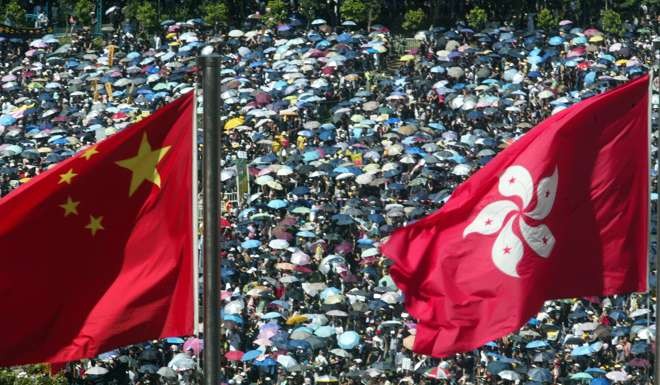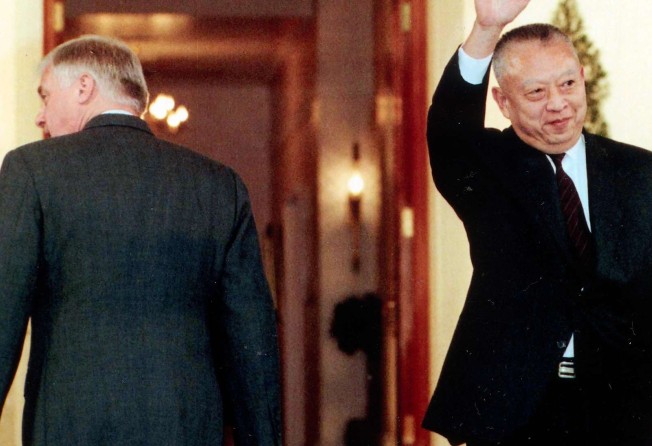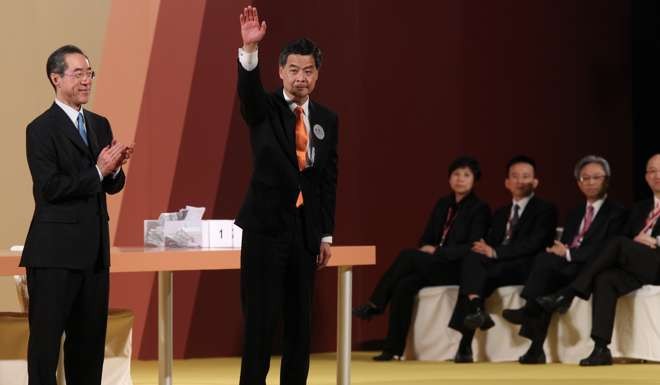
Beijing’s quandary: how to best ‘manage’ Hong Kong’s chief executive election
Regina Ip says the central government is caught between ensuring an acceptable and smooth transition, and giving due worth to public opinion to avert mass protests

In the summer of 2014, on the eve of the Legislative Council’s vote on the government motion for election of the chief executive by universal suffrage, Zhang Rongshun (張榮順), vice-chairman of the Legislative Affairs Commission of the National People’s Congress Standing Committee, met a group of pro-Beijing political and community leaders in Shenzhen, in a last-ditch effort to mobilise support for the motion.
Zhang indicated that the central authorities were willing to give Hongkongers an opportunity to elect their chief executive by universal suffrage – not provided for in the Sino-British Joint Declaration on the future of Hong Kong, but in the Basic Law – partly in response to the fervent demand of Hong Kong people, and partly to get the city out of the prevailing impasse. Zhang’s pronouncements made it quite clear that Beijing was fully aware that Hong Kong was stuck in an impasse – a political deadlock that was holding back progress on all other fronts.
By design, Hong Kong is supposed to have an “executive-led” government – the government taking the initiative to draw up its agenda, and enjoying sufficient clout to make sure its agenda gets timely legislative approval. Hong Kong’s “rose garden” project (the new airport and related infrastructure development) in the early 1990s is a shining example of such “executive-led” triumph.
Successive colonial administrations, however, managed to pull off such landmark projects because the executive branch had the legislature under its thumb. Until the mid-1980s, all non-official legislators were appointed, while senior civil servants masquerading as “ministers” formed the majority. The administration always had enough votes to bulldoze its initiatives through Legco, until the last governor, Chris Patten, removed the last officials from the legislature in 1995. The first chief executive, Tung Chee-hwa, was thus faced with a rude awakening when he took over in 1997.
The political system he inherited had undergone a sea change. With a rising number of popularly elected legislators all playing to the gallery, Tung’s administration scrambled to form a “governance coalition” with pro-government political groups in Legco. This coalition suffered its first setback in 2003, when the Liberal Party decided to jump ship in the wake of widespread community opposition to the government’s national security bill.

Since then, successive chief executives have been faced with the same institutional drawback of having a weak popular mandate compared with democratically elected legislators. The fact that all chief executives have been elected by a small committee dominated by pro-Beijing and pro-business votes, especially votes controlled by landed interests, does not help to counter public perceptions that the system is rigged against the ordinary man.
The outcome will have a profound impact on the future of Hong Kong as well as ‘one country, two systems’
The next chief executive election will be upon us in less than six months. As the result of the defeat of the government motion on the chief executive election in June 2015, Hongkongers are stuck with the unpalatable prospect of electing their next chief through a 1,200-member committee, representing fewer than 250,000 voters.
The central authorities are caught in a no less invidious quandary. Their natural instinct is to ensure elections in Hong Kong do not “spin out of control”, in the sense of returning a winner unacceptable to Beijing. Yet they fully understand the importance of returning a candidate who enjoys popular support and can get things done.
In light of the competitive and acrimonious fight in 2012 between Henry Tang Ying-yen, the widely expected successor to Donald Tsang Yam-kuen, and challenger Leung Chun-ying, it is unlikely that Hong Kong people would accept a return to the old, highly conservative and uncompetitive model of Beijing throwing its weight behind only one candidate, as in the case of Tung’s re-election in 2002.

Assuming an uncontested election is unlikely to be acceptable to the people, the maths of the election means Beijing would accept at most three validly nominated candidates: two from the pro-establishment camp and one from the pan-democratic camp, as in 2012. Presumably, it was the pattern established in 2012 which led the NPC Standing Committee to stipulate in its decision of August 31, 2014, that two to three candidates may be nominated for election by universal suffrage.
[Beijing knows] any ‘anointment’ could trigger a mass protest among those pressing for change
Beijing has been treading cautiously thus far, without dropping any hints of a preferred candidate, knowing that any such “anointment” could trigger a mass protest among those pressing for change, which could mean a great majority of society.
The election of the new Legco president last Wednesday clearly showed how doubts about whether Andrew Leung Kwan-yuen, the consensus pro-establishment candidate, retains the right of abode in the UK almost torpedoed the process, and continue to be used by his critics.
With at least four to five candidates continuing to be tipped as likely contestants, plus one possible credible challenger from the pan-democratic camp, appropriate “management” of the next chief executive election has become a critically sensitive priority for those overseeing Hong Kong.
The outcome will have a profound impact on the future of Hong Kong as well as “one country, two systems”. Hong Kong people wait with bated breath to see how the drama plays outs.
Regina Ip Lau Suk-yee is a legislator and chair of the New People’s Party